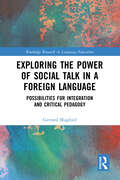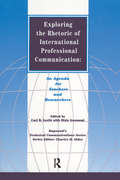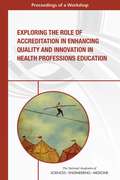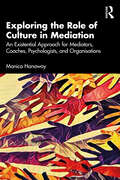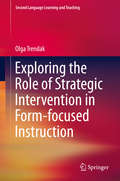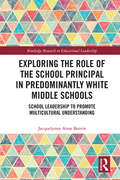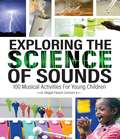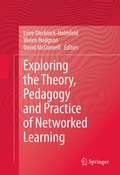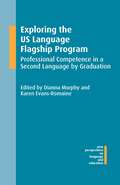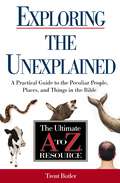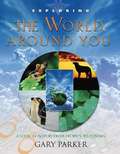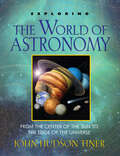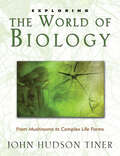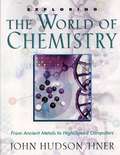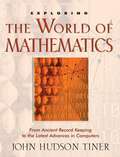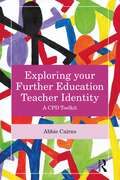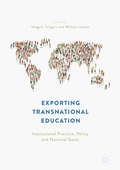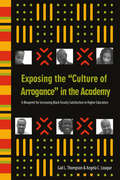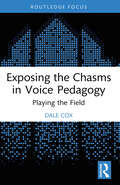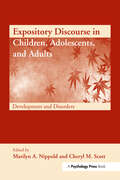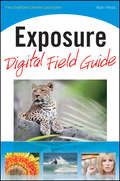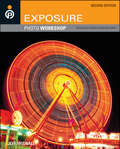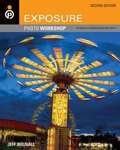- Table View
- List View
Exploring the Power of Social Talk in a Foreign Language: Possibilities for Integration and Critical Pedagogy (Routledge Research in Language Education)
by Gerrard MugfordThis book examines the fundamental interactional dimension to foreign language communication, including the establishment, development, consolidation and maintenance of interpersonal relations. It argues that interpersonal language use such as small talk, casual conversation and gossipy talk is not only key to meaningful and productive communication but that it is an essential dimension with respect to successful foreign language interaction and that engaging in interpersonal language is communicatively valuable and worthwhile in its own right. Crucially, it explores how teaching and learning can utilize the role of social talk and relational engagement in helping interactants to express, voice and convey their own values, attitudes and beliefs. Finally, it develops a critical relational pedagogy focused on language speakers’ needs, objectives and desires. Redressing the imbalance between transactional and interactional language teaching, and stressing the importance of phatic and relational language use in helping language users achieve their communicative goals, it will appeal to researchers, postgraduates, and scholars in the fields of education and linguistics.
Exploring the Rhetoric of International Professional Communication: An Agenda for Teachers and Researchers (Baywood's Technical Communications)
by Carl R. Lovitt Dixie GoswamiPresents a collection of fourteen essays that responds to the need for a more rhetorical conception of professional communication as an international discipline. This book challenges the adequacy of relying on preconceived notions about the factors that determine discourse in international professional settings.
Exploring the Role of Accreditation in Enhancing Quality and Innovation in Health Professions Education: Proceedings of a Workshop
by Engineering Medicine National Academies of SciencesThe purpose of accreditation is to build a competent health workforce by ensuring the quality of training taking place within those institutions that have met certain criteria. It is the combination of institution or program accreditation with individual licensure—for confirming practitioner competence—that governments and professions use to reassure the public of the capability of its health workforce. Accreditation offers educational quality assurance to students, governments, ministries, and society. Given the rapid changes in society, health, and health care, the National Academies of Sciences, Engineering, and Medicine hosted a workshop in April 2016, aimed to explore global shifts in society, health, health care, and education, and their potential effects on general principles of program accreditation across the continuum of health professional education. Participants explored the effect of societal shifts on new and evolving health professional learning opportunities to best ensure quality education is offered by institutions regardless of the program or delivery platform. This publication summarizes the presentations and discussions from the workshop.
Exploring the Role of Culture in Mediation: An Existential Approach for Mediators, Coaches, Psychologists, and Organisations
by Monica HanawayThis new book explores the historical development of mediation (conflict resolution) from a cultural and existential perspective, and considers the cultural challenges involved for a mediator.The author, Monica Hanaway, has been mediating disputes across cultures for several years. She sets the scene for exploring the role culture plays in conflict and its resolution by explaining what mediation is and what we understand by the word ‘culture’. From there she explores what mediators need to keep in mind when considering culture in the context of mediation. Within this, she covers such topics as the merits of using interpreters, and the pros and cons of using mediators from the same culture as the disputants. The final section of the book comments on what mediation professional and training bodies need to do to raise the profile of the cultural aspects in conflict.Written by an experienced practitioner, Exploring the Role of Culture in Mediation will be of particular interest to all mediators, coaches, and psychologists, those interested in applying philosophy to resolving conflict, and those considering mediation.
Exploring the Role of Strategic Intervention in Form-focused Instruction
by Olga TrendakThe monograph is devoted to the notion of strategic intervention and its application in the foreign language classroom, in particular with reference to teaching grammar structures. The first four chapters, which are theoretical in nature, address such concepts as form-focused instruction, language learning strategies and strategies-based instruction. The last chapter provides insight into the results of a study investigating the grammar learning strategies employed by advanced learners of English. Additionally, the chapter presents the views of foreign language teachers on the idea of introducing strategy training in the foreign language classroom. The book closes with the discussion concerning the implementation of strategy training and its value in teaching target language grammar.
Exploring the Role of the School Principal in Predominantly White Middle Schools: School Leadership to Promote Multicultural Understanding (Routledge Research in Educational Leadership)
by Jacquelynne Anne BoivinBy detailing an explanatory sequential mixed methods study grounded in Critical Race Theory (CRT), this book explores the role of effective educational leadership in developing multicultural acceptance in predominantly white schools. Drawing on the rich experiences and accounts of school principals in rural middle schools in the US, the volume asks how principals’ personal attitudes, professional experiences, and the degree to which they view themselves as a mentor and influencer within the school impacts their approach to improving multicultural understanding amongst students, staff, and faculty. The text is organized into five clear chapters, providing critical reflections, a review of the relevant literature, and in-depth discussion of first-hand data. Six key findings relating to whole-school acceptance, the role of individual principal’s attitudes, and support for teaching staff open new avenues for research and inform recommendations for the professional development of school principals. In presenting key theory and practical implications of research, this book will be crucial reading for researchers, scholars, and practitioners in the fields of educational leadership, multicultural education, sociology of education, and teacher education.
Exploring the Science of Sounds: 100 Musical Activities for Young Children
by Abigail Flesch ConnorsMost preschool teachers have musical instruments in their classrooms, but may not realize they can use them for science explorations. Science, technology, engineering, arts, and math—STEAM—these explorations are crucial for laying a solid foundation for later learning. In this book, discover 100 activities that let children ages 3–6 explore the science of music and sound using materials easy to find for a preschool classroom. Children will use their bodies to create sounds, explore the relationship between size and pitch, investigate how tempo affects the way we listen to sounds, create musical instruments, and much more. From the drops of rainwater to the tinkling of wind chimes, the science of sound is all around. You will indulge young children’s curiosity and engage them in scientific inquiry as they explore, listen, observe, experiment, think, and discuss different kinds of sounds and the tools for making them. Through playful activities, explore: Acoustics—what is sound? Volume—loud and soft Tempo—fast and slow Timbre—sound quality Pitch—high and low
Exploring the Theory, Pedagogy and Practice of Networked Learning
by David Mcconnell Lone Dirckinck-Holmfeld Vivien HodgsonThis book will be based on a selection of high quality research papers presented at the Networked Learning Conference, May3-4, 2010. The Networked Learning Conference is an international, research-based conference. Since its inception in 1998 the conference has developed a strong following by international researchers. In addition it is well supported by practitioners, managers and learning technologists interested in contributing to and hearing about research in this area. The conference is considered a major event in the international 'technology enhanced learning' conference circuit. This edited volume presents cutting edge research that will explore current trends and advances in research on networked learning, technology enhanced learning and e-learning.
Exploring the US Language Flagship Program: Professional Competence in a Second Language by Graduation
by Karen Evans-Romaine Dianna MurphyA number of reports in the US have highlighted the country's need for improved second language skills for both national security and economic competitiveness. The Language Flagship program, launched in 2002, aims to raise expectations regarding language proficiency levels at the post-secondary level and to address structural gaps in the curricula of many L2 programs. This federally funded program provides opportunities for US undergraduate students in any specialization to reach a professional level of competence in a targeted second language by graduation. This volume highlights innovative practices that enable students to achieve this goal - even those with no exposure to the second language prior to university. This book explores the rationale and history of the federal program and showcases models and strategies of existing Flagship programs.
Exploring the Unexplained: A Practical Guide to the Peculiar People, Places, and Things in the Bible
by Trent C. ButlerHave you ever wondered about those giants in Genesis or that reference to Enoch in Jude? Exploring the Unexplained: A Practical Guide to the Peculiar People, Places, and Things in the Bible answers all your questions about unusal, hard-to-explain, and difficult-to-understand stories in the Bible. Learn more about people like Enoch, Moses, and the Nephilim. As with other books in Thomas Nelson's A to Z series, Exploring the Unexplained helps you gain a deeper understanding of the Bible in an easy-to-read format. Features include: Scripture index Topical index Easy-to-understand explanations of some of the Bible's most confusing stories A convenient tool for individual and group study
Exploring the World Around You
by Dr Gary ParkerIt has been said that our planet is really just an insignificant speck in a vast universe, but that's not true! In fact, the conditions for life found on earth are supremely unique and make our life here comfortable. This despite the reality that the world around us is also tainted and in need of careful calibration in order to continue. This scripturally founded book opens a window to the spectacular environments found on our planet, from deserts to the tropics, with respect to creationism. Researchers and biologist Dr. Garry Parker brings his vast knowledge of ecology to a teaching setting, exploring and explaining ecosystems, population growth, habitats, adaptations, energy problems, and much more. Learn about insect control in California, why mammals have fur, and how sharks maintain "friendships" with small fish know as remora. Exploring the World Around You brings the varieties of our planet's habitats alive to the reader, and is a wonderful learning tool complete with illustrations, chapter tests, and an index.
Exploring the World of Astronomy
by John Hudson TinerDiscover how to find constellations like the Royal Family group or those near Orion the Hunter from season to season throughout the year How to use the Sea of Crises as your guidepost for further explorations on the moon's surface Investigate deep sky wonders, extra solar planets, and beyond as God's creation comes alive! Think you know all there is to know about our solar system? You might be surprised at some of the amazing details that you find when you begin Exploring the World of Astronomy! From the rugged surface of the moon to the distant and mysterious constellations, this book provides an exciting educational tour for students of different ages and skill levels. Learn about a blue moon, the 400-year storm on Jupiter, and what is meant by "the zone of life." Discussion ideas, questions, and research opportunities help expand this great resource on observational astronomy into an unforgettable educational course for middle school to high school students!
Exploring the World of Biology
by John Hudson TinerDISCOVER THEWORLD OF LIFE AS GODCREATED IT! The field of biology focuses on living things, from the smallest microscopic protozoa to the largest mammal. In this book you will read and explore the life of plants, insects, spiders and other arachnids, life in water, reptiles, birds, and mammals, highlighting God's amazing creatio. You will learn about the following and so much more: How does biological classification give each different type of plant or animal a unique name? In what ways are seeds spread around the world? What food does the body use for long-term storage of energy? How did biologists learn how the stomach digested food? What plant gave George de Mestral the idea for Velcro? For most of history, biologists used the visible appearance of plants or animals to classify them. They grouped plants or animals with similar-looking features into families. Starting in the 1990s, biologists have extracted DNA and RNA from cells as a guide to how plants or animals should be grouped. Like visual structures, these reveal the underlying design or creation. The newest book in our Exploring series, Exploring the World of Biology is a fascinating look at life - from the smallest proteins and spores, to the complex life systems of humans and animals.
Exploring the World of Chemistry
by John Hudson TinerChemistry is an amazing branch of science that affects us every day, yet few people realize it, or even give it much thought. Without chemistry, there would be nothing made of plastic, there would be no rubber tires, no tin cans, no television, no microwave ovens, or something as simple as wax paper. This book presents an exciting and intriguing tour through the realm of chemistry as each chapter unfolds with facts and stories about the discoveries and discoverers. Find out why pure gold is not used for jewelry or coins. Join Humphry Davy as he made many chemical discoveries, and learn how they shortened his life. See how people in the 1870s could jump over the top of the Washington Monument. Exploring the World of Chemistry brings science to life and is a wonderful learning tool with many illustrations, biographical information, chapter tests, and an index for easy referencing.
Exploring the World of Mathematics
by John Hudson TinerNumbers surround us. Just try to make it through a day without using any. It's impossible: telephone numbers, calendars, volume settings, shoe sizes, speed limits, weights, street numbers, microwave timers, TV channels, and the list goes on and on. The many advancements and branches of mathematics were developed through the centuries as people encountered problems and relied upon math to solve them. For instance: What timely invention was tampered with by the Caesars and almost perfected by a pope? Why did ten days vanish in September of 1752? How did Queen Victoria shorten the Sunday sermons at chapel? What important invention caused the world to be divided into time zones? What simple math problem caused the Mars Climate Orbiter to burn up in the Martian atmosphere? What common unit of measurement was originally based on the distance from the equator to the North Pole? Does water always boil at 212? Fahrenheit? What do Da Vinci's Last Supper and the Parthenon have in common? Why is a computer glitch called a "bug"? It's amazing how ten simple digits can be used in an endless number of ways to benefit man. The development of these ten digits and their many uses is the fascinating story you hold in your hands: Exploring the World of Mathematics.
Exploring your Further Education Teacher Identity: A CPD Toolkit
by Abbie CairnsOffering a new approach for further education (FE) and vocational educators, this practical guide provides the tools and techniques necessary to trace and map professional identities and consider how these evolve and recognise continuing professional development needs.Exploring the theoretical grounding and key tools in the form of Likert scales and networks of enterprises, this practical guide is packed full of useful tips and case studies that illustrate the practical applications of the tools and the benefits of using them. With key examples drawn from FE and vocational teachers working across the sector, this book is designed to provide insight and CPD guidance for anyone grappling with two or more professional identities. In a changing professional landscape where teachers are expected to fulfill multiple roles simultaneously, this book has the power to reshape how teachers reflect on their dual or multifaceted identities.Exploring your Further Education Teacher Identity is essential reading for vocational FE teachers and their managers, trainee teachers, and teacher educators who want to better understand their professional identities and feel more in control of where they position themselves.
Exporting Transnational Education: Institutional Practice, Policy and National Goals
by Vangelis Tsiligiris William LawtonThis book focuses on the dynamic and rapidly expanding field of transnational higher education (TNE). Despite the increasing importance of TNE and the interest it has attracted from various stakeholders, there is a lack of theoretical and empirical evidence on several aspects pertaining to its operation and governance. This book provides a unique combination of contributions from researchers and practitioners in a wide variety of case studies from TNE exporting countries in Europe and Asia. In doing so, the editors, with added support from Dr Christopher Hill, examine how this gap between research and practice can be bridged. This valuable edited collection will be of use to researchers and practitioners in transnational education, as well as students and scholars of international education and higher education policy.
Exposing the "Culture of Arrogance" in the Academy: A Blueprint for Increasing Black Faculty Satisfaction in Higher Education
by Gail L. Thompson Angela C. LouqueThere generally remains a gulf between the way most Black faculty perceive the racial climate at their institutions and the recognition by non-Black faculty and administrators that there are problems and that these perceptions have merit. This book is intended to promote a productive dialogue.This book weaves the authors’ own experiences with the responses of 136 Black faculty to a questionnaire, and a smaller sample who were interviewed, to identify the factors that determine Black faculty’s satisfaction or dissatisfaction with their jobs and institutions.Recurring themes underscore the importance of a supportive work environment that is built on mutual respect, full inclusion in the decision-making process, and an institutional climate that does not tolerate cultural insensitivity or racism. The qualitative and quantitative information and the authors’ conclusions can help postsecondary institutions improve Black faculty satisfaction levels, and ultimately, retention rates.This book will resonate with any Black faculty who have felt frustrated enough to consider leaving a postsecondary institution and with those who are content at their current institutions. For non-Black faculty and for administrators of all races, the book illuminates the sources of job satisfaction and dissatisfaction, explains the reasons their Black colleagues leave or stay, and offers valuable recommendations for change. For anyone, at any level, interested in the issue of the racial climate at his or her institution, this book offers a constructive framework for discussion and action
Exposing the Chasms in Voice Pedagogy: Playing the Field
by Dale CoxThis concise book critically examines the intersection of power, privilege, and classical music in higher education through an extensive study of the experiences, training, and background of teachers of musical theatre singing.Mapping the divides within the voice pedagogy field, it shows how despite the growth of non-classical programmes, the teaching of vocal music in the United States continues to be structurally dominated by Western classical music. Drawing on extensive fieldwork and observations of practicing instructors, the author argues that current voice pedagogy training’s classical-centred approach fails to prepare instructors to teach the range of vocal styles needed in the contemporary musical theatre profession. Combining a critical review of existing practices with proposals for change, this book sheds light on a key problem in voice pedagogy today.Based on field research and drawing on both Shulman’s signature pedagogies theory and Bourdieu’s concepts of habitus, capitals, practice, and field, this book will be useful for scholars, researchers, and practitioners of voice pedagogy, higher music education, performance education, cultural studies, music, musical theatre, and theatre studies.
Expository Discourse in Children, Adolescents, and Adults: Development and Disorders (New Directions in Communication Disorders Research)
by Marilyn A. Nippold Cheryl M. ScottSchool success in the 21st century requires proficiency with expository discourse -- the use and understanding of informative language in spoken and written modalities. This occurs, for example, when high school students read their textbooks and listen to their teachers' lectures, and later are asked to demonstrate their knowledge of this complex topic through oral reports and essay examinations. Although many students are proficient with the expository genre, others struggle to meet these expectations. This book is designed to provide information on the use and understanding of expository discourse in school-age children, adolescents, and young adults. Recently, researchers from around the world have been investigating the development of this genre in typical students and in those with language disorders. Although many books have addressed the development of conversational and narrative discourse, by comparison, books devoted to the topic of expository discourse are sparse. This crossdisciplinary volume fills that gap in the literature and makes a unique contribution to the study of language development and disorders. It will be of interest to a range of professionals, including speech-language pathologists, teachers, linguists, and psychologists who are concerned with language development and disorders.
Expository Reading and Writing Course: Student Reader
by California State UniversityA task force of high school and CSU faculty has developed the Expository Reading and Writing Course (ERWC), a full-year college preparatory English course for high school juniors or seniors. The ERWC aligns with the California English-Language Arts Content Standards, addresses critical reading and writing problems identified by the CSU English Placement Test Committee, and prepares students to meet the expectations of college and university faculty.
Expository Thoughts on the Gospels: John, Volume 1
by J. C. RyleExposition of the first part of the Gospel of John.
Exposure Digital Field Guide
by Alan HessSecrets of exposure revealed, with a bonus color checker card includedExposure is the number one topic that digital photographers want to know about. This full-color book fits in your camera bag and provides all the information you need on this very important aspect of digital photography.Exposure involves combining ISO, aperture, and shutter speed in different variations to accomplish your vision of the perfect image. Exposure Digital Field Guide takes you through the complex techniques of good exposure, taking you from hobbyist to serious amateur photographer.Explains how to adjust shutter speed and aperture to control the amount of light hitting the camera's light sensorTeaches you how to "see the light" for the perfect exposureHelps you gain confidence as you move from automatic controls into manipulating the elements of exposure for specific resultsPacked with stunning full-color photographs to illustrate what you can achieveProvides suggested settings for various shooting situations and subjectsIncludes a tear-out color checker card to help you maintain true colorFits in your camera bag for ready reference in the fieldExposure Digital Field Guide helps you master one of the most complex and intricate elements of digital photography.
Exposure Photo Workshop
by Jeff WignallNamed One of Shutterbug Magazines Top Digital Imaging Books of 2008! Capturing an image and getting the right exposure is critical and Jeff Wignall recognizes exposure as the secret for creating an image that captures a vision and shares it with the world. When you apply his techniques with patience, experimentation, and a focus on the outcome, you will begin creating images that reveal not only what you saw, but how you felt when you saw it. In fact according to Shutterbug magazine Exposure Photo Workshop "may be the best book yet written about exposure. " By learning to work with natural light as well as when to use flash you will confidently capture action, night scenes, rainbows, sunsets, and reflections like never before. With stunning images, Jeff Wignall shows you how to perfectly expose pictures in even the most challenging existing light conditions, including poor weather, using a flash, and even a section guiding you through using multiple wireless flash units. You can upload your own images to Photoworkshop. com and get feedback from other photographers. Wignall starts by explaining the fundamentals of exposure and why it's important. This leads into learning the basics of exposure controls. By the end of chapter 2, you will know how to control the exposure on your point-and-shoot or digital SLR camera. Chapter 3 walks readers through measuring light using just about any light meter and Chapter 4 delves into lens apertures and depth of field. The focus moves to shutter speed and subject motion. After Chapter 6, you'll have the knowledge and confidence to turn off your camera's automatic settings and take manual control. Wignall then examines natural light exposures, discussing the intricacies of light quality, light direction, and time of day. As you approach more advanced exposure options, you'll need the troubleshooting advice provided in Chapter 8, covering difficult situations such as metering challenges, handling contrast, and creating dramatic silhouettes. With more advanced techniques mastered, you can then approach night and low-light conditions and then examine special considerations such as the weather and natural phenomena. The book finishes strong with a comprehensive look at all things flash photography.
Exposure Photo Workshop, 2nd Edition
by Jeff WignallNew and updated techniques for working with exposure Exposure involves a variety of skills, but once mastered, can turn a hobbyist into a bona fide photographer. This hands-on resource dissects the components of exposure--ISO, aperture, shutter speed--and shows how they work together to capture the photographer's vision. You'll learn how to leave the safety of automatic settings and understand how controlling the settings can result in beautiful photos. Stunning photos of people, wildlife, and landscapes serve to inspire you to practice your new skills in exposure and create memorable and frame-worthy photos. Unveils the many intricate levels of exposure and clearly explains how to master each one so that you can capture amazing photos Encourages you to apply each of the techniques you learn with patience and experimentation when photographing people, wildlife, landscapes, or any other subject matter Details the essentials for taking frame-worthy photos in a variety of challenges, such as action, night scenes, low light, bad weather, and more Features updated, stunning, and inspiring full-color photos throughout Expose yourself to the fantastic and unparalleled advice contained within the pages of Exposure Photo Workshop, Second Edition!
